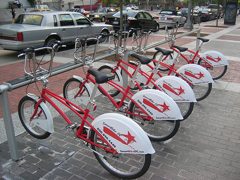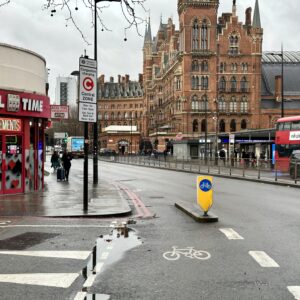
After several months of delay following the initial “launch”, Washington D.C. is basking in the glow of becoming the first large U.S. city to offer a bike-sharing system.
Will their approach work? Should Portland be jealous? Why weren’t we first?
Dubbed SmartBike DC and operated by Clear Channel Outdoor, the service offers a total of 120 bikes at 10 stations in and around D.C.’s downtown core. For keen bike-sharing observers, that small number should raise immediate concerns. When the French launched their Velib’ system in Paris over a year ago, they started with 10,000 bicycles at 750 rental stations.
“We’re not interested in being first, we’re interested in getting it right.”
— Commissioner Adams’ Chief of Staff Tom Miller
A program of similar size to SmartBike DC is being used in Brussels, and officials there have had trouble getting it to catch on. The widely-read TreeHugger blog pointed out the problems with a story titled, Free Bikes Flop in Brussels, published back in January. Reasons for the lackluster success include not having enough bikes available and not renting them for free (users of D.C.’s system must pay an annual fee).
The lesson seems to be that simply having a bike-sharing system in place does not guarantee success.
Even so, D.C.’s bike-sharing launch immediately made some wonder why Portland didn’t do it first. After all, we’re considered America’s most bike-friendly city and we’ve been chewing on the idea for well over year (see all my coverage here).
A local weekly paper says it has to do with dollars and sense. That’s true; In Portland, the financial realities of a bike-sharing system mean our plans must take a different path.
Oregon’s Supreme Court has interpreted the First Amendment in a way that does not allow cities to have private advertising in the public right-of-way (and billboard-laden bikes are in the right-of-way). In D.C., and other cities, private ads on the bikes are the key way programs costs are recouped. Also, as the Willamette Week story points out, Portland’s bus shelters are managed/owned by TriMet, not the City.
These financial constraints mean that in Portland, the City will have to make a considerable investment in the bike-sharing program.
According to Commissioner Sam Adams’ Chief of Staff Tom Miller, that’s one reason they’re moving forward cautiously. With “significant public contribution” at stake, they simply don’t want to rush into it (just imagine the backlash if it fails).
“We’re not interested in being first,” Miller told me yesterday, “we’re interested in getting it right.”
Miller says he’s watching D.C.’s progress and that he thinks the scope of their system is too limited and “that’s a mistake.”
“D.C. can be Brussels,” he added, “we’d be happy being Paris.”
——-
— Read more stories about Portland’s bike-sharing plans in the BikePortland archives.







Thanks for reading.
BikePortland has served this community with independent community journalism since 2005. We rely on subscriptions from readers like you to survive. Your financial support is vital in keeping this valuable resource alive and well.
Please subscribe today to strengthen and expand our work.
I hate to say it, but I just don\’t get bike sharing and I\’m skeptical that this idea will ever take off in the States.
Maybe I\’m wrong. I\’ll watch DC with some interest.
Didn\’t Portland already do bike sharing nearly a decade ago? How is this different from the yellow bikes?
\”Didn\’t Portland already do bike sharing nearly a decade ago?\”
sort of. the \”yellow bikes\” were a bunch of beater bikes released into the city. they were stolen.
\”How is this different from the yellow bikes?\”
vastly different. the \”yellow bikes\” thing was a grassroots, non-profit attempt. what we\’re talking about now is a high-tech, fully-managed, turn-key system with bikes that are not easily stolen and are available and pre-determined locations.
As a resident of DC, I can\’t figure out who is going to be using these. They locations seem to be geared to tourists, but will tourists be buying memberships just to tool around for a couple hours. Generally, the roads in DC are not very bike friendly and messengers and hard core commuters tend to make up most of the cycle traffice around the mall and central business districts. These folks normally have their own bikes.
One of the key reasons I suspect bike sharing won\’t work in Portland is that the place where it would be most useful–the city center–already has a major competitor: fareless square.
I\’m sure I\’m not being imaginative enough, but the best use I can think of for bike sharing would be to run out and do an errand in the middle of the day while at work. Farless square + the bus mall + streetcar + MAX allows one to do that pretty easily as is. Perhaps if (when?) farless square is abolished bikesharing will make more sense, until that happens I just don\’t see the need.
The system looks and sounds just like the one I used in Stockholm a few weeks ago. Tom Miller and Sam Adams, and a dozen other Portland decision makers, were there and tried it out too.
It is a nice system in some respects – the bikes were comfortable, could carry packages, looked good and rode easily – but in others it was terribly inconvenient.
You have to \”join\” first, by finding an office that sold memberships, which was a big barrier to using them for a quick trip or for tourists (like us). The three-hour limit on use was a real pain, and if you needed to return your bike at the end of that three-hour window you had to find a station (not easy), and then hope that it had an open space for you to put your bike in – it didn\’t always!
I didn\’t like this sytem very much.
But more generally, I think Tom Miller and Sam Adams are smart to take it slow and ensure that we get the best system for Portland and that we get a huge roll-out with enough bikes and stations to make it instantly successful.
Let me tell you what I saw in Paris this summer.
The Paris \”Velib\” system doesn\’t require much effort to join. You can just sign up for a day (one Euro flat rate) right at the kiosk. I think you go online to sign up for a week or month (4 or 17 Euros, respectively, or something like that). Once you are in, you can check out a bike quickly. In the week/month cases you get a card that makes checking a bike out even quicker. You can use a bike for less than 30 minutes for free, returning it to any site in town (otherwise it wouldn\’t work). If you come to a site and there are no slots to return it to, you need to claim this fact on the automated kiosk and then you have 15 minutes to find another site. The sites are all over the city (otherwise it wouldn\’t work). The second 30 minutes costs you a Euro. The third costs you 2 Euros, I think. The fourth and subsequent half hours cost you 4 Euros each, which adds up really fast. One Euro was $1.58 when we were there. They\’ve got your credit card so you can\’t weasel out I expect.
As I understand it, the way the business works is that the city of Paris, in return for the bike deal, makes ad space available on small billboards at all the bike rental sites. This is the real deal that makes it possible. The actual bike rental business is a loser. That\’s my understanding based on glancing at some semi-vague info on the web.
Unfortunately, I didn\’t get a chance to actually try it out in Paris when I was there recently, but the bikes were in broad use by the general population, especially adults under 50. The free half hour is convenient and usually enough in a relatively flat and super-compact city like Paris. If you really need more you can just switch bikes mid-stream.
They had the very same Velib system in Brussels, but I didn\’t see one of the bikes in use in Brussels. The rental sites are further apart, the city is less compact (once you\’re outside the old city) and the streets are less bike friendly than Paris.
Like most commuter bikes in Paris these are certifiable clunkers. There are almost no derailleurs, toe clips, or dropped bars in Paris, and few bikes are made of anything lighter than galvanized plumbing pipe. Even butted steel is a luxury. These Velib bikes are heavy, well maintained, easy to fit, puncture-resistant, and cargo-capable. They have built-in always-on dynamo lighting and three internal gears. They won\’t get your clothes dirty. But they weigh a lot. And they have a lot of mass, to boot. Did I mention their weight? It\’s high. You don\’t see them in Montmartre (\”the\” hill in Paris). Not at all.
This reminds me of light rail. Portland starting building MAX first, but San Diego and another city started later but finished first. MAX is larger, better, and serves more passengers because Portland took the time to do it right, and to build a system that accommodated a large number of users. The DC bike-rental system doesn\’t appear to be geared for that, and 120 bikes is nothing. Maybe they\’ll expand the system into something friendly, intuitive, and useful (and hopefully ubiquitous). Until then, I\’m glad that Portland is thinking about the right way to implement such a system, and doing it the right way rather than being the first and grabbing the bragging rights.
I just don\’t like the association with Clear Channel.
Though, in DC, the only time I needed a bike was when I was out in Maryland. Otherwise I just walked or took the Metro.
Fareless Square. MAX and Streetcar. Walkable half-sized city blocks. Hills. Rains eight months a year.
I think that the odds are against bike rental being a winner here in Portland. Most locals own their steeds and I don\’t think many tourists (sans helmets)would feel comfortable riding a rental on strange streets.
If the city wants something to spend money on, how about covered and secure bike parking? I think that does more to induce bike usage than having a rental fleet available.
I take it that the statement that Oregon law \”does not allow cities to have private advertising in the public right-of-way\” means that cities themselves are not allowed to own and operate such advertisement-laden vehicles in the public right-of-way, but that private vehicles are allowed. Obviously this must be the case with MAX and the Streetcar, as they are owned by TriMet and Portland Streetcar, so why not just have a private firm run them?
Or, why not have Tri-Met take out the contract for the bike rental service?
This actually makes PERFECT sense.
Tri-Met is the government agency responsible for public transportation in the tri-county metro area.
Tri-Met is the government agency that already has the right to place street furniture with advertising on it in the public ROW.
And Tri-Met is the government agency that already has a problem with bicycle capacity on its trains.
So, why shouldn\’t Tri-Met sign the contract for the bike-rental service? They could place a pod at MAX stations in the suburbs (and nearby destinations), they could saturate the central cities, and they could make it a part of their own advertising contract.
City of Portland and Tri-Met should of course work together to make it work, but ultimately, it sounds like Tri-Met, not CoP, would be the ideal agency sponsor for this initiative!!
I totally understand the City\’s caution to move forward with this. Besides the financial and logistical challenges, it seems unclear how much demand there is for this in Portland. And yes, the only successful roll-outs in Europe to date have been the ones that started with a large number of bikes and stations.
One major reason the CycloCity project in Brussels didn\’t pan out was that only the relatively small downtown core (i.e. Ville de Bruxelles, which is only one of the 19 \”communes\” that make up Brussels) was on board for this project. That means that you are very limited in how far you could venture with these bikes, making it really only attractive for tourists. And even then, Brussel\’s two largest train stations (Gare du Nord and Gare du Midi) are located just outside the downtown core, so they didn\’t put a bike station at neither location. Somewhat surreal and therefore very Belgian…
In addition, as someone who grew up in Brussels, I must say that it is not the most bike-friendly city in Belgium, although they\’ve made some great strides in the last decade improving the road infrastructure and adding bike facilities.
Still, the general feel in Brussels is that it was mostly a \”me-too\” type prestige project that was not thought out so well to boot. Or as a Belgian proverb goes: \”When it rains in Paris, it drizzles in Brussels.\”
Portland like Brussels is not compact and actually has varied terrain. Bike sharing done by Tri Met will not work because Tri Met has no interest in such a cause.
Tri Met is Bus or Rail. Their operators handle the city of Portland\’s streetcar or ohsu\’s tram but they are not Tri Met for a reason… Both of these projects are things which the agency felt were a gamble.
At its heart Tri Met is an extremely cautious agency, and its expansions of light rail are due to its enormous popularity, and potential for redevelopment/development of its neighboring communities.
So remember that bike sharing is good, but only good in places that are: extremely compact and flat(Europe/Midwest in 20 to 30 yrs). Portland will need a bunch of urban infill before this happens.
A tourist to Portland is generally a tourist of Oregon. What I mean is that they come to our city for two days and then go to the Gorge and then Bend and if time remains Crater Lake/Ashland.
Really what we need is a solid rail line all over our state that allows bikes. I don\’t own a car so visits to Bend or Ashland take some serious planning. With a dedicated(no sharing with freight) rail line I could plop my bike on and be all over my home state!
bdan: i second that last paragraph of yours. we need good passenger rail and lots of it.
I\’m curious if anyone else here in Portland has bike-sharing provided by their employer? The company I work for purchased a relatively nice, comfortable, easy to manuever bicycle that sits at the bottom of the stairwell. It has a bell, light, a rack, a lock and panniers(sp?) Anyone is welcome to use it to run to a close meeting or other such errand. I like it because my commuter bike is a road bike with clipless pedals, it wouldn\’t be feasible for me to hop on and off for meetings and errands as easily. I wonder if a \”bike-sharing\” company could exist that provided this service(a bike, lock, maintenance, etc.) to companies as an employee benefit type deal. It seems like companies wouldn\’t have to deal with it themselves, could pay some initial setup and then monthly fee, and could promote it as part of the \”green\” program at their company…
Any thoughts?
Bike Sharing= A waste of Valuable resources/energy that could be applied elsewhere.
Plus,(once again) encouraging tourists(the obvious target of just such a system) to ride lackluster bikes on streets not deemed safe enough for even the local daily commuters, is a \”Irresponsible Act\”.